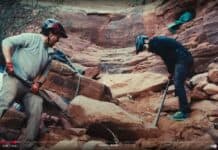A member of the Cottonwood City Council recently voiced some confusion about how we journalists report on local news.
I reached out to answer his questions about how we source, investigate and report on the news. That said, this information is certainly not exclusive to elected officials — it’s good for anyone to know and I’m more than happy to share the way we in the news business do our work.
Nearly all government activity is open to the public — except ongoing investigations, private personnel matters and discussion held by a legislative body in executive session with its legal counsel. That includes documents, records and recordings and emails, phone records and text messages on government-issued phones and personal phones when discussing official government activity.
If we’re curious about what elected officials or government staffers may be writing to constituents or each other, we can file public records requests with that government body. Access to federal records is governed by the Freedom of Information Act of 1967.
Access to government records in Arizona, from those of school boards to those of the state legislature, are governed by Arizona public records laws that mirror and expand on FOIA.

While some officials don’t send many emails, others may send out hundreds, so we ask for keywords or for a date range to get relevant records. Often we find other tidbits in those records that lead to other stories.

Most governments also offer newsletters and automated emails, from code updates and job postings to minutes from council meetings. We sign up for all of those for all five cities in both counties that we cover. We also send our reporters to public government meetings as applicable, usually if there’s something newsworthy or notable on the agenda that we think readers want or need to know about.

A significant number of meetings approve consent items or discuss issues that may be of relevance to particular applicants or parties but are not really of general interest to the community as a whole. Regardless, governments are, by law, required to keep permanent records of such meetings. Some governments go above and beyond and offer video or audio recordings, which are becoming more and more common as digital data storage becomes easier and cheaper, but the only legal requirement is official meeting minutes.
“Whatever a patron desires to get published is advertising; whatever he wants to keep out of the paper is news.”
from the desk of L.E. Edwardson, day city editor of the Chicago Herald and Examiner, 1918
A good number of our stories about government actions and nongovernmental or private activities of public interest for feature or profile stories do not come from official sources or documents but from people willing to tell us their stories — a veteran, student, teacher, volunteer or artist — or offer a point of view on an issue of public interest.
For something more controversial, like a dispute that has general public interest or influence, or something involving two or more sides, we reach out as best we can to the parties involved to get their views on what happened, what’s happening now and what they plan to do. In an ideal world, such a story would contain commentary from all the factions and a clear indication as to who is more “right,” but we live in a gray world where differences in interpretation, perception and opinion, even about the law, prevent such simplicity. So the best we can do is lay out the case to readers, summarize all that we’ve learned, quote those involved and leave it up for readers to interpret the issue using their own judgment.
The biggest hindrance in news reporting is that we often contact people are willing to give us truthful details, but decline to do so on the record. This is the crux of the difference between rumor and journalism. We sometimes get information that is 100% valid or accurate, but without confirmation by an on-the-record source, we are ethically unable to put that into a story. For instance, at a crime scene or an accident, we may be told details that we know to be true but can’t report until they are officially confirmed.
“It is part of the business of a newspaper to get news and to print it; it is part of the business of a politician to prevent certain news being printed.“
from the 1903 the book “Journalism as a Profession” by Alfred C. Harmsworth, publisher of “The Daily Mail” of London
We can sometimes subsequently verify the facts independently with another source willing to go on the record, or a document, record or recording, and then report on a topic, but if no other source is available, it’s one of those things where we know we know, but we can’t report on it.
We’re also often given documents or records by people who wish to remain anonymous to readers because they’re not at liberty to provide us those records, i.e., a “leak.” Because we know who they are, we know the records to be accurate and the identity of the person who provided them is immaterial. The official document is what matters.

The most important part of journalism is developing personal relationships with our sources, from government staffers and elected officials to members of the public who know from past interactions or from our reputation for honesty and integrity that we can be trusted to handle what they provide and quote them fairly. Relationships takes time and effort to build, and are our most invaluable resource, because these are the folks who provide us with details not yet available publicly, slip us things others would rather keep hidden or officially confirm things we know to be true.
In the end, that’s our job: Report things that are true and accurate to the best of our knowledge at the time we go to press, quote honestly the factions involved and provide all the relevant facts so that readers, voters, constituents and the public know what’s happening in their community, how their tax dollars are being spent, what their officials are saying publicly and privately and what laws they are upholding or violating. Ultimately, all of this work is done for you.
Christopher Fox Graham
Managing Editor
“I know that my retirement will make no difference in its cardinal principles, that it will always fight for progress and reform, never tolerate injustice or corruption, always fight demagogues of all parties, never belong to any party, always oppose privileged classes and public plunderers, never lack sympathy with the poor, always remain devoted to the public welfare, never be satisfied with merely printing news, always be drastically independent, never be afraid to attack wrong, whether by predatory plutocracy or predatory poverty.”
Joseph Pulitzer’s retirement speech on April 10, 1907, as reported in the St. Louis Post-Dispatch on April 11, 1907.



















